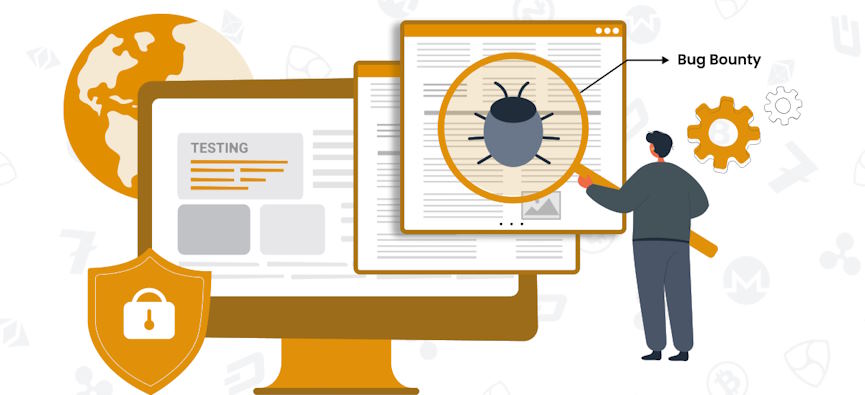Bug Bounties in the Cryptocurrency Space: Incentivizing Security Researchers

Bug bounties, originating as a practice in the software industry, have transitioned into a critical component of safeguarding digital assets, platforms, and protocols in the cryptocurrency domain. With high-profile breaches making headlines, organizations within the cryptocurrency space have recognized the need for proactive security measures. Bug bounties offer a unique solution by tapping into the expertise of a global community of security researchers and ethical hackers, harnessing their skills to identify vulnerabilities before malicious actors can exploit them. As we explore the multifaceted landscape of bug bounties within the cryptocurrency sector, we uncover the symbiotic relationship that has emerged between these security-minded individuals and the projects they assist, ultimately driving the industry toward greater resilience and trust.
The Cryptocurrency Landscape: Vulnerabilities and Threats
Overview of the unique security challenges in cryptocurrencies:
The dynamic and transformative nature of cryptocurrencies brings with it a set of unique security challenges. Unlike traditional financial systems, cryptocurrencies operate in a decentralized and pseudonymous environment, making them susceptible to a range of threats. The open-source nature of blockchain technology, while fostering innovation, also exposes vulnerabilities that malicious actors can exploit. Additionally, the irreversible and irreversible nature of cryptocurrency transactions adds complexity to security considerations.
Types of vulnerabilities that can be exploited:
- Smart contract vulnerabilities: Smart contracts, self-executing pieces of code that automate transactions on blockchain platforms like Ethereum, are prone to coding errors. These errors can lead to serious vulnerabilities, including funds becoming irretrievable due to flawed logic or susceptibility to hacking.
- Exchange platform weaknesses: Cryptocurrency exchanges act as intermediaries for trading, but they too are vulnerable. Poor security measures can expose user data, lead to unauthorized access, and result in large-scale breaches. High-profile exchange hacks have highlighted the importance of robust security protocols.
- Blockchain protocol issues: The foundational protocols of cryptocurrencies can also be exploited. 51% attacks, where a malicious entity gains control of the majority of a blockchain’s computational power, can compromise the integrity of transactions and lead to double-spending.
How Bug Bounties Work
Mechanics of a bug bounty program:
Bug bounty programs operate on a structured framework to harness the collective power of security researchers in identifying and rectifying vulnerabilities. The process involves:
- Defining scope and rewards: Organizations outline the specific areas, systems, or platforms eligible for testing and the corresponding rewards for successful bug reports.
- Eligibility and participation criteria: Organizations set criteria for who can participate, often open to both professional researchers and the general public. Clear guidelines are established to ensure ethical and responsible behavior.
- Submission and evaluation process: Security researchers submit their findings to the organization, detailing the discovered vulnerability and its potential impact. Organizations then evaluate the submissions for validity and severity.
- Payouts and recognition: Rewards are given based on the severity of the reported issue. Researchers receive monetary compensation, but recognition in the form of public acknowledgment and reputation-building also plays a significant role.
Benefits of bug bounty programs for organizations:
- Access to a diverse pool of talent: Bug bounty programs tap into a global community of security experts with diverse skill sets. This diverse perspective helps uncover vulnerabilities that might be missed through in-house testing.
- Continuous security testing: Bug bounties provide ongoing security assessment, allowing organizations to identify and rectify vulnerabilities as they arise, enhancing the overall robustness of their systems.
- Cost-effectiveness compared to traditional security audits: Traditional security audits can be expensive and time-consuming. Bug bounties offer a cost-effective alternative, paying only for valid vulnerabilities identified rather than upfront fees.
Bug Bounties as Incentives for Security Researchers
Attractive features of participating in cryptocurrency bug bounties:
Cryptocurrency bug bounty programs offer security researchers a compelling array of incentives to engage in the proactive hunt for vulnerabilities:
- Financial rewards: Bug bounties often come with substantial monetary rewards, providing researchers with an avenue to earn while contributing to the security of the digital landscape.
- Learning opportunities: The complexity of blockchain systems and cryptographic protocols presents a fertile ground for learning and skill development. Researchers can deepen their expertise in cutting-edge technologies and security mechanisms.
- Collaboration with industry experts: Engaging in bug bounty programs connects researchers with top-tier professionals in the cryptocurrency domain, offering opportunities for mentorship, networking, and exposure to real-world challenges.
Profiles of successful bug hunters in the cryptocurrency sector:
Across the cryptocurrency landscape, successful bug hunters stand as testament to the impact of their contributions. Individuals who have unearthed critical vulnerabilities, prevented potential breaches, and bolstered the security of prominent platforms have garnered respect and recognition within the industry.


